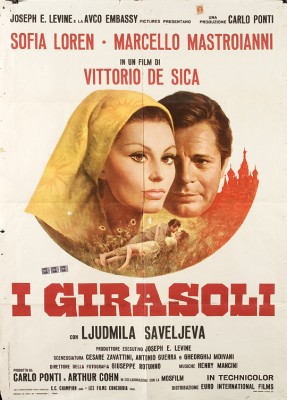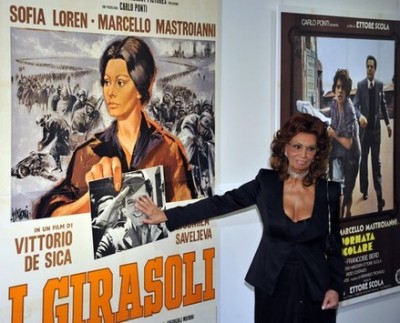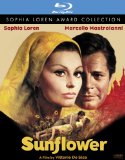| Reviews & Columns |
|
Reviews DVD TV on DVD Blu-ray 4K UHD International DVDs In Theaters Reviews by Studio Video Games Features Collector Series DVDs Easter Egg Database Interviews DVD Talk Radio Feature Articles Columns Anime Talk DVD Savant Horror DVDs The M.O.D. Squad Art House HD Talk Silent DVD
|
DVD Talk Forum |
|
|
| Resources |
|
DVD Price Search Customer Service #'s RCE Info Links |
|
Columns
|
|
|
Sunflower
I wasn't too taken with the picture when I first saw it three years ago, but appreciate its virtues more with this second viewing. The stand-alone Blu-ray, unfortunately, is a disappointment. The image is soft and smeary with highly visible dirt and damage here and there. It does look like a new transfer, and it's very slightly better than Lions Gate's DVD, but not by much. Extras are limited to a still gallery and trailers for this and other films in the collection.
Neapolitan seamstress Giovanna (Loren) falls in love with 32-year-old Milanese electrician-turned-soldier Antonio (45-year-old Mastroianni), whom she likes to call "Anto." It's a whirlwind courtship; after just four days they're inseparable. To avoid shipping out to Africa they get married, which entitles Antonio to 12 days of additional leave, but when that time's up the couple then conspire to win him the Italian equivalent of a Section Eight discharge. However, they can't keep their hands off one another, the ruse is discovered, and he's shipped off to the Russian Front.
Casualties there are appallingly high. His letters to both Giovanna and Antonio's mother (Anna Carena) stop, and by the end of the war everyone but mother and wife believe him dead. (All this happens during the first 30 minutes of the film.) In an effectively painful sequence, Giovanna and relatives of other soldiers desperately hold signs and photographs as war-weary soldiers return from the front lines. After Stalin's death Giovanna visits Russia, virtually going door-to-door in search of her beloved Antonio.
Though at times schmaltzy and predictable, Sunflower has many assets, including Sophia Loren's performance, which like an earlier pairing with Mastroianni, Yesterday, Today & Tomorrow, affords her the opportunity to play different ages, from presumably her early 20s to middle 40s. (It's hard to tell for sure. Many of the Russian sequences play in front of exteriors either barely dressed or not at all, with late-'60s fashions, etc. very visible in the background. The later scenes could be set anywhere from roughly 1954-1969.) Anyway, she's gives it her all, viscerally expressing all the anguish and heartbreak without overdoing it.
She also has real chemistry with Mastroianni, with whom she made a baker's dozen of features. Indeed, only they could get away with the otherwise hokey opening scene, where while making love on the beach he nearly chokes to death on her earring. Or, as wartime newlyweds, when they make a 24-egg omelet. Nothing much happens beyond "Pass the salt" yet the two have such intimate familiarity they really sells the scene and their relationship. Also very good in the picture is beautiful Ludmila Savelyeva, who just before this played Natasha in Sergei Bondarchuk's incredible seven-hour-plus War and Peace.
The film is basically an Italian Umbrellas of Cherbourg (1964) minus the songs, with Giovanna's anguished search for Antonio also similar to Kinji Fukasaku's later Under the Flag of the Rising Sun (1972). It was an Italian-French co-production, but all the scenes filmed on location in the Soviet Union were with the cooperation of Mosfilm, and the U.S. version's titles (included on this release, even though the feature is uncut and presented in Italian) credit Embassy's Joseph E. Levine as executive producer. That credit may be deliberating misleading and refer only to the U.S. release version, but then again maybe Levine helped secure the services of composer Henri Mancini, whose lovely score (reminiscent in some ways of Two for the Road) adds considerably to the film's lushness, though its main theme is outrageously overused.
Amidst all the romance and heartbreak, the antiwar theme works because it's realistically (and epically) done, even cleverly incorporating horrific stock footage from the Russian front of frozen soldiers and mass graves. There's also a darkly funny side to the film many don't notice. In one scene a freezing Antonio spots a small cottage with a warm light in the window and smoke coming from the chimney. He opens the door to find a hundred troops so packed in like sardines most are asleep standing up. There's not a square-inch to spare, leaving Antonio no choice but to close the door and walk away.
The footage shot inside the Soviet Union is pretty amazing, especially around contemporary Moscow, including visually fascinating scenes at a big train station and, later, at a stadium where at least 100,000 people watch a soccer match. A big chunk of the Soviet scenes are filmed spitting distance from a huge nuclear power plant. It's not Chernobyl, but still impressive, and impressive that De Sica would be allowed to photograph it at all. There are, of course, a number of Soviet-made films available now on DVD but this outsider's vantage point makes it exceptionally interesting. (Supposedly this was the first non-Communist Bloc production allowed to shoot there.)
Video & Audio
Sunflower seems to have been remastered, at least based on the aspect ratio used for this release, though possibly from the same inferior film source. The older, 16:9 enhanced DVD version's opening titles were 1.66:1 while the rest of the picture was 1.78:1 widescreen. The Blu-ray release is 1.85:1 throughout, which appears correct. (1.85:1 has long been the standard for non-scope Italian films.) The 1080p image here is soft, even blotchy, and seems to have been digitally tweaked in the manner of HD Cinema Classics' over-processed PD titles (The Terror, The Stranger, etc.) though not nearly as bad as that. The film also shows signs of damage, the most distracting example the film's first shot of snowy Russia. The screen is virtually nothing but white save for three ugly green lines running down the right side of the frame. It's not a terrible release, but given the very high, Criterion-level SRP ($29.95) it deserves to look a lot better than this. The earlier DVD had Spanish and English subtitle options but the Blu-ray offers only English subs. For the record this version runs 107 minutes, 22 seconds - six minutes longer than the longest running times listed on Wikipedia and the IMDb.
Extra Features
Extras are limited to trailers for this, Yesterday, Today & Tomorrow and Marriage, Italian Style, all in high-def. Picture quality varies: Yesterday, Today & Tomorrow looks fantastic, but the trailer for Sunflower is as soft as the feature presentation. A high-def still gallery is also included.
Parting Thoughts
I liked Sunflower more the second time around, even as I was disappointed with the high-def video transfer, which barely rises above the level of the average DVD. But for the movie alone, this is Recommended.
Stuart Galbraith IV's audio commentary for AnimEigo's Tora-san, a DVD boxed set, is on sale now.
|
| Popular Reviews |
| Sponsored Links |
|
|
| Sponsored Links |
|
|
| Release List | Reviews | Shop | Newsletter | Forum | DVD Giveaways | Blu-Ray | Advertise |
|
Copyright 2024 DVDTalk.com All Rights Reserved. Legal Info, Privacy Policy, Terms of Use,
Manage Preferences,
Your Privacy Choices | |||||||

















